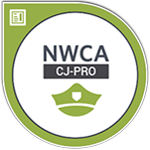PURPOSE
The Criminal Justice credential documents the essential competencies for a variety of professionals who work in the criminal justice arena.
AUDIENCE
This credential is appropriate for a variety of professionals that work in the criminal justice field, with victims and offenders, and in law enforcement and supportive roles. Examples of these positions include criminal justice and law enforcement professionals and trainers, lawyers, substance abuse and behavioral disorder counselors, social workers, career counselors, judicial clerks and other court personnel, intelligence analysts, police identification and records officers, immigration and customs inspectors, forensic scientists and technicians, fish and game wardens, clinical psychologists, criminal investigators, juvenile justice professionals, and others that are involved in or support criminal justice activities.
JOB/CAREER REQUIREMENTS
This credential documents competencies including how the U.S. criminal justice system is organized and functions, how crime data is collected and reported, how criminology theories and models are applied to investigating and solving crime and working with victims and offenders, how criminal law is applied, and how the juvenile justice system works in the U.S. It further includes detailed definitions for specific crimes against persons, property, the public, government, and morality as well as crimes related to drugs, human trafficking and smuggling, and terrorism including how these crimes are categorized, investigated, and reported. It also includes the organization of the courts and the steps in prosecuting and sentencing a criminal. Finally it includes an overview of the U.S. correctional systems and characteristics of prison life including current challenges associated with prisons and jails.
CRIMINAL JUSTICE WORKPLACE TASKS:
- Law enforcement professionals must understand the criminal justice system as they enforce the local, state, and federal laws, deal with criminals and victims, and investigate specific crimes
- Criminal investigators must understand the criminal justice system in order to correctly identify important elements of crime related evidence, investigate suspects, work with victims, and handle and prepare evidence for prosecution of offenders
- Social workers who work with both adults and juveniles must understand the criminal justice system in order to prepare their clients for court, corrections, or related activities
- Probation and parole officers must understand the criminal justice system in order to supervise offenders in their case load and provide accurate advice and supervision
- Court personnel must understand how the criminal justice and U.S. court system works in order to understand their role in the court process
- Corrections professionals must understand the criminal justice and U.S. court and corrections systems in order to effectively and ethically perform their jobs
- Fish and game wardens, forest and park rangers, and other professionals working with the public must understand the criminal justice system and the various types of crimes
EXAM STRUCTURE OVERVIEW
Number of Questions in Exam: 140
Total Time: 120 minutes
Overall Passing Score: 70%
(All sections require an individual passing score of 70%)

